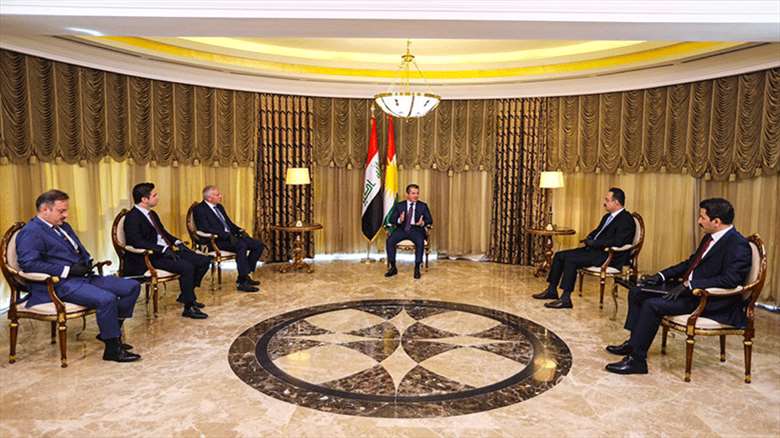Kurdistan PM Masrour Barzani talks Erbil-Baghdad ties, reform in interview

ERBIL (Kurdistan 24) – During an interview with local media outlets on Monday, among them Kurdistan 24, Kurdistan Region Prime Minister Masrour Barzani reiterated the importance of his cabinet's reform agenda and diversifying the region's economy, and detailed the latest talks with the federal Iraqi government.
Erbil-Baghdad Relations
Barzani explained that the agreement with Baghdad is currently for three months only, and noted that the two sides intend to reach a comprehensive budget deal after this period.
Read More: Iraq agrees to send Kurdistan part of its budget: KRG
Regarding the situation in disputed areas between the federal and regional governments, Barzani said that dialogue is ongoing to fill the "security vacuums" and curb movements of the so-called Islamic State. He also noted that Erbil continues to work for the implementation of Article 140 of the Iraqi constitution.
The article Article 140 outlines a process to officially decide whether disputed areas are to be considered within or outside the autonomous Kurdistan Region, a process that has still never been implemented, over a decade past its constitutional deadline.
The territories disputed by the Kurdistan Regional Government (KRG) and the federal government of Iraq include many cities, towns, districts, and villages stretching from the provinces of Kirkuk and Diyala in the east to Nineveh in the west, near the Syrian border.
The Prime Minister also explained that KRG representatives were part of an Iraqi delegation in the United States. He added that he had sent a letter to US Secretary of State Mike Pompeo, affirming Erbil's commitment to continue dialogue with Baghdad to reach solutions to all outstanding issues.
"We live in a region full of problems, and our most important problem is the lack of unity," Barzani stated. "Many political parties seek to preserve the region's constitutional status, but unfortunately, there are some parties that work otherwise, and the people of Kurdistan are the only arbiter in this regard."
Reforms
The Reform Law, passed in January, was the centerpiece of Barzani's administration before the coronavirus pandemic took over the world's headlines and recast public health as Erbil's main priority. Still, the regional government has pushed forth with its reform plan, which aims to eliminate "ghost employees" and "to bring fairness" to the public pension system, according to the parliament's website.
The Prime Minister stressed that "reform is an ongoing process, and not something that can be achieved in a short period." He added that his cabinet's initiative "is not only limited to ending corruption, but also includes transparency, how to best severe the public, and finding the best way to construct a solid economic infrastructure."
"Our efforts were to increase internal revenue, diversifying sources of income, and investments, like developing the agriculture sector, industries, and tourism."
"However, unfortunately, the global COVID-19 crisis has hindered our efforts towards achieving all that," said Barzani, noting that the efforts would continue.
Regarding the coronavirus disease, the premier asserted that "the regional authorities were the first to take many measures to protect citizens, but unfortunately some parties are playing with the lives and safety of citizens and turning it into a political issue."
He claimed that such entities were fomenting suspicion among some citizens about whether the virus exists in the first place.
On Monday, the region's Ministry of Health reported a new record number of fatalities due to the coronavirus. The total tally is now nearly 25,000 cases, including 930 deaths and about 15,000 recoveries.
Read More: Highest COVID-19 death toll in Kurdistan Region, as WHO and KRG launch COVID awareness campaign
Editing by Khrush Najari
